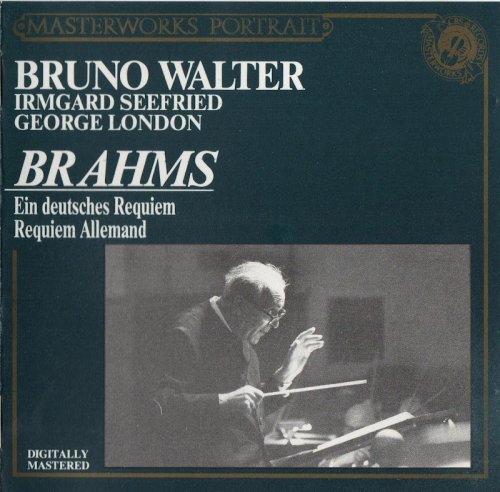
Bruno Walter - Brahms: Ein Deutsches Requiem (1989) CD-Rip
BAND/ARTIST: Bruno Walter
- Title: Brahms: Ein Deutsches Requiem
- Year Of Release: 1989
- Label: CBS
- Genre: Classical
- Quality: FLAC (image+.cue,log,scans)
- Total Time: 63:06
- Total Size: 323 Mb
- WebSite: Album Preview
Tracklist:
01. I . Selig sind die da Leid tragen [0:08:55.37]
02. II. Denn alles Fleisch ist wie Gras [0:13:10.28]
03. III. Herr lehre doch mich [0:09:46.50]
04. IV. Wie lieblich sind deine Wohnung [0:04:51.17]
05. V. Ihr habt nun Traurigkeit [0:06:41.48]
06. VI. Denn wir haben hie keine bleibende Statt [0:10:08.52]
07. VII. Selig sind die Toten [0:09:31.73]
Performers:
Irmgard Seefried - soprano
George London - bass-baritone
Westminster Choir
New York Philharmonic
Bruno Walter – conductor
01. I . Selig sind die da Leid tragen [0:08:55.37]
02. II. Denn alles Fleisch ist wie Gras [0:13:10.28]
03. III. Herr lehre doch mich [0:09:46.50]
04. IV. Wie lieblich sind deine Wohnung [0:04:51.17]
05. V. Ihr habt nun Traurigkeit [0:06:41.48]
06. VI. Denn wir haben hie keine bleibende Statt [0:10:08.52]
07. VII. Selig sind die Toten [0:09:31.73]
Performers:
Irmgard Seefried - soprano
George London - bass-baritone
Westminster Choir
New York Philharmonic
Bruno Walter – conductor
Bruno Walter is a conductor who knew how to stamp the works he conducted and recorded, especially those from the religious repertory, with the seal of his warm poetic sensitivity and his radiant humanity. Through these scores, he manages to communicate his vision to us, and, without ever forcing an already strong text, without false sentiment or gratuitous effect, he leaves us room for a more personal interpretation of the music. Brahms composed his Requiem at the beginning of his career, at under thirty-five- the age at which Mozart died (this means that both composers wrote their Requiems at about the same age). Brahms must have first had the idea of writing a requiem as early as the year of Schumann's death (1856), but the work did not really take shape until 1861. He took it up again in 1865-1866, after the death of his mother, and the score was considered finished during the summer of 1866. At that time it consisted of only six movements. The first three were played in Vienna in December of 1867, under the direction of Johann Herbeck, and a "performance of the full set of six was given at Bremen Cathedral on Good Friday, April 10, 1868, with Brahms himself conducting. Afterwards, Brahms added what is now the fifth movement, and it was Karl Reinecke who conducted the first performance of the final seven movement version, in Leipzig, on February 18, 1869.
This work is not a true Requiem according to Catholic liturgy. Rather, it is a cantata of Protestant inspiration, composed to words in German which Brahms himself had taken directly from the Bible. In this, his procedure resembled that of Schutz two centuries earlier. Hence the title. A German Requiem, about which Brahms later said: "I would gladly replace the word "German" with the word "Human" in my title." Indeed, this music reflects not only the composer's Nordic sensibility, his Reformist beliefs and his veneration for Holy Scripture but also -and above all- the freedom and distance that he always kept with regard to any constraint, be it religious or otherwise.
Brahms does not use a vocal quartet for the solos: only a soprano comes in in the fifth part and a baritone in the third and sixth parts. The chorus dominates, for, true to its original intention, the work essentially addresses itself to a community. Typical is the absence of the "Dies Irae" and, more generally, of almost every reference to the Last Judgement, even the promise of Paradise. This Requiem is a serious reflection on death and a profession of hope in a joyous Resurrection. Its first three parts are almost entirely devoted to earthly sufferings, while the last four gradually lead-through faith, consolation and joy in a living God-to eternal happiness. -- Marc Vignal
This work is not a true Requiem according to Catholic liturgy. Rather, it is a cantata of Protestant inspiration, composed to words in German which Brahms himself had taken directly from the Bible. In this, his procedure resembled that of Schutz two centuries earlier. Hence the title. A German Requiem, about which Brahms later said: "I would gladly replace the word "German" with the word "Human" in my title." Indeed, this music reflects not only the composer's Nordic sensibility, his Reformist beliefs and his veneration for Holy Scripture but also -and above all- the freedom and distance that he always kept with regard to any constraint, be it religious or otherwise.
Brahms does not use a vocal quartet for the solos: only a soprano comes in in the fifth part and a baritone in the third and sixth parts. The chorus dominates, for, true to its original intention, the work essentially addresses itself to a community. Typical is the absence of the "Dies Irae" and, more generally, of almost every reference to the Last Judgement, even the promise of Paradise. This Requiem is a serious reflection on death and a profession of hope in a joyous Resurrection. Its first three parts are almost entirely devoted to earthly sufferings, while the last four gradually lead-through faith, consolation and joy in a living God-to eternal happiness. -- Marc Vignal
Classical | FLAC / APE | CD-Rip
As a ISRA.CLOUD's PREMIUM member you will have the following benefits:
- Unlimited high speed downloads
- Download directly without waiting time
- Unlimited parallel downloads
- Support for download accelerators
- No advertising
- Resume broken downloads


